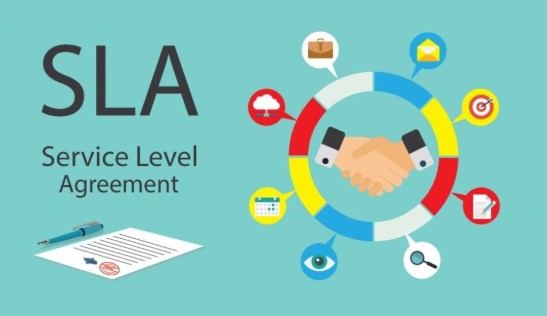Software SLA Agreements: Ensuring Service Reliability And Accountability

Software services are essential for managing vital processes, increasing productivity, and preserving customer happiness in the ever-changing digital landscape. Cloud-based solutions that are accessible to companies of all sizes are provided by Software as a Service (SaaS) models, which are becoming more and more popular. However, the reliability of these services is paramount, as even minor downtime or performance issues can have significant repercussions. This is where software SLA agreements come into play. SLAs are formal contracts that define the service expectations between a provider and a customer, ensuring accountability and a clear understanding of service standards. Let’s dive deeper into why SLAs are essential in the software industry and how they promote service reliability and accountability.
What Is A Software SLA?
A legally binding contract that outlines the precise standards of service, uptime guarantees, and performance indicators anticipated between a service provider and a customer is called a Software Service Level Agreement (SLA). The supplier must meet the key performance indicators (KPIs) listed in this document, which include response time, system uptime, and support resolution deadlines. SLAs also typically include provisions for compensation or penalties if these standards are not met, ensuring that customers are protected and that providers are held accountable.
Read also: Innovations in Digital Wallet Technology: AI and Beyond
Key Components Of A Software SLA
A comprehensive SLA includes several critical components:
- Service Scope And Availability: Clearly defines what services are covered under the SLA and specifies the expected uptime or availability, often expressed as a percentage (e.g., 99.9% uptime).
- Response And Resolution Time: Outlines the response time for addressing issues based on their severity and the timeframe for resolving them.
- Performance Standards: Specifies the expected performance levels, such as transaction speeds or latency, ensuring the software functions efficiently.
- Support And Escalation: Defines the support channels available, such as phone, email, or chat, along with the escalation procedures for unresolved issues.
- Penalties And Compensation: Details the penalties or compensations for service breaches, such as service credits or financial refunds.
- Review And Termination Clauses: Provides conditions for SLA review and possible termination of the agreement under specific circumstances.
Importance Of SLA In SaaS Business
In the SaaS industry, where companies rely on continuous access to cloud-based software, SLAs play a pivotal role in establishing trust and reliability. Here’s why SLAs are particularly important for SaaS businesses:
1. Establishing Trust And Reliability
SLAs set clear expectations for both the provider and the customer, creating a foundation of trust. When SaaS providers outline their commitment to service reliability and performance, customers can feel confident that the provider will uphold high standards. This trust is crucial in a SaaS business model, where customers rely on uninterrupted access to software to run their daily operations.
2. Accountability And Transparency
A well-defined SLA promotes transparency and accountability. By specifying metrics such as uptime guarantees and support response times, the SLA holds the SaaS provider accountable. Customers know what to expect, and the provider understands the obligations they must meet. This transparency also helps prevent misunderstandings and disputes, as both parties have a clear reference point for acceptable performance levels.
3. Protection Against Service Interruptions
For businesses, even minor service interruptions can lead to lost revenue, decreased productivity, and customer dissatisfaction. SLAs serve as a safety net, providing customers with recourse if the provider fails to meet the agreed-upon standards. Many SLAs include provisions for service credits or refunds in the event of downtime, which can help mitigate the financial impact of service disruptions.
4. Improved Service Quality And Continuous Improvement
SLAs often motivate SaaS providers to maintain high standards and strive for continuous improvement. By outlining performance metrics and penalties for failing to meet these standards, SLAs encourage providers to invest in robust infrastructure, reliable support, and proactive monitoring. This leads to better overall service quality, benefiting both the provider and the customer.
How SLAs Ensure Service Reliability And Accountability?
Software SLAs contribute directly to service reliability and accountability by setting specific targets and consequences. Here’s how SLAs make a difference in practice:
- Defining Clear Metrics For Performance: By specifying acceptable levels for uptime, response times, and resolution speeds, SLAs set clear performance benchmarks. Providers are thus incentivized to prioritize system stability and swift issue resolution, ensuring reliable service.
- Incentivizing Proactive Maintenance: Knowing that penalties may apply for service disruptions, providers are more likely to invest in preventive maintenance, monitoring, and backup solutions. The chance of service interruptions is reduced by this proactive strategy.
- Providing Recourse For Service Failures: SLAs offer customers protection by stipulating penalties or compensations in case of service lapses. This can include service credits, discounts, or refunds, providing financial relief to customers affected by downtime or degraded performance.
- Strengthening Customer-Provider Relationships: SLAs reinforce the relationship between SaaS providers and their clients by fostering open communication and mutual understanding. Providers who adhere to SLAs demonstrate commitment to customer satisfaction, which strengthens long-term business relationships.
Conclusion
Software SLA agreements are essential for any SaaS business, providing a structured framework that ensures service reliability and accountability. By defining clear expectations, outlining service commitments, and setting provisions for accountability, SLAs protect customers from potential service failures while motivating providers to maintain high standards. A well-written SLA gives SaaS companies a competitive edge and increases customer trust by demonstrating their dedication to providing dependable, superior service. SLAs will continue to play a crucial role in the software sector as more companies move to cloud-based solutions, providing dependable and responsible service.




